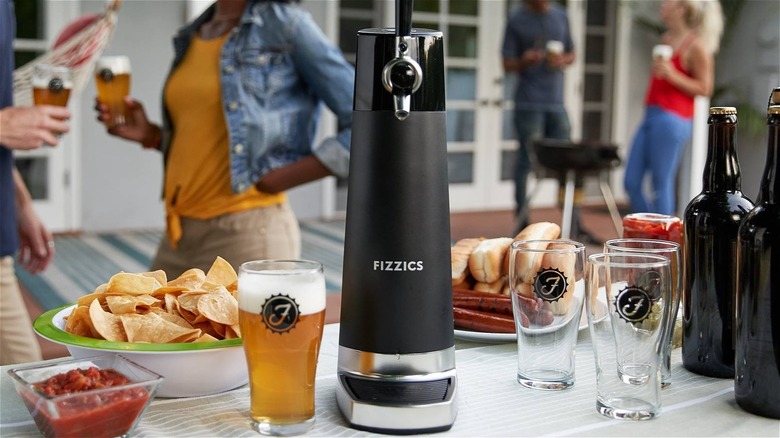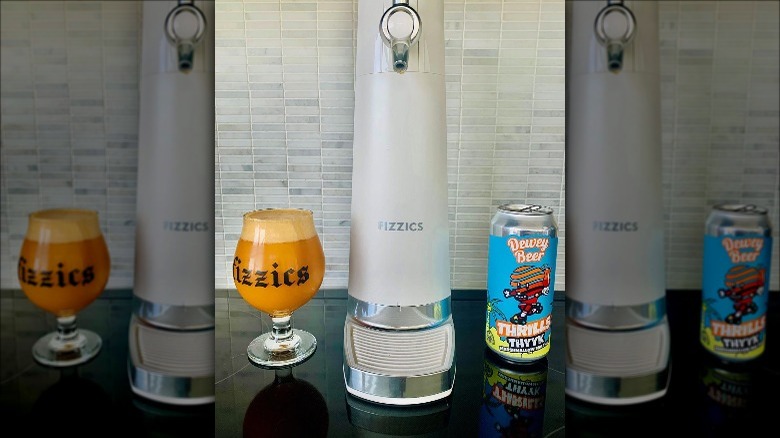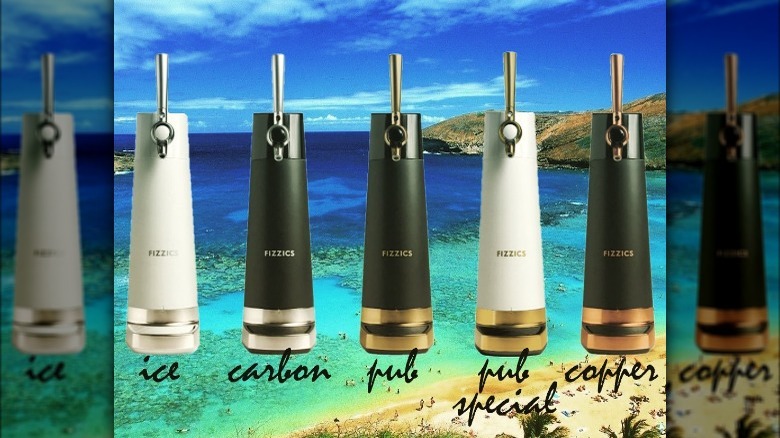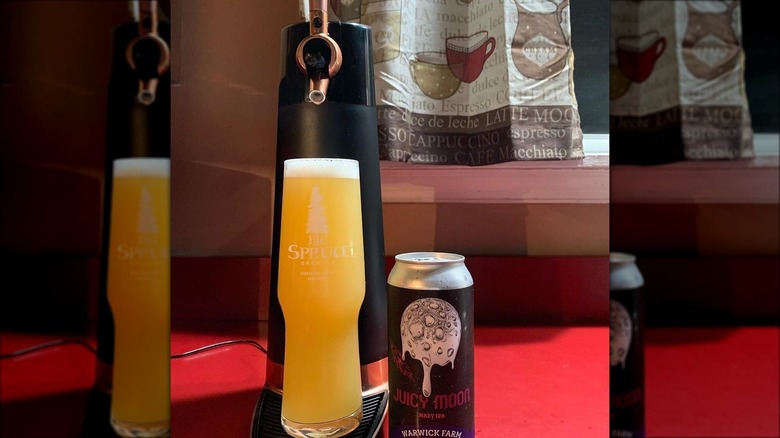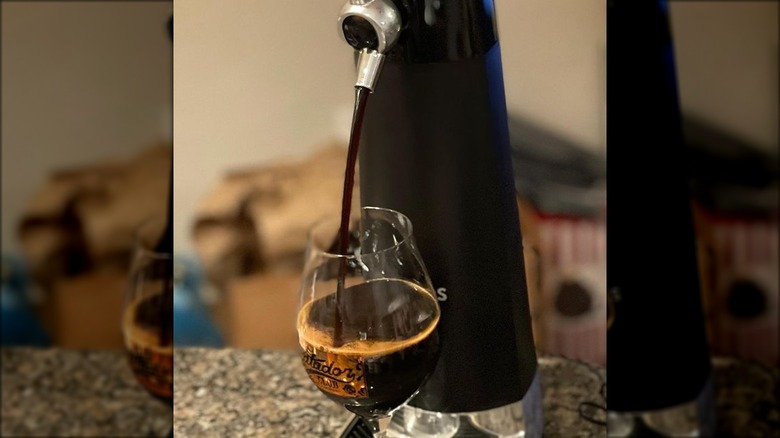What Happened To Fizzics After Shark Tank?
There are a lot of "Shark Tank" food and drink inventions that flopped. From less-than-impressive presentations and defective products to businesses that just can't come to an agreement with the Sharks, there are a lot of ways that things can go awry for those seeking investments. But some of the most exciting moments on the show happen when a company's presentation is so compelling that it gets several Sharks to compete with each other for a piece of the pie.
That's what happened with Fizzics, a company selling a machine that can turn any beer into a nitro-style tap beer that was already boasting impressive sales — $3.2 million in just eight months. The company founders believed that most beer tastes better on draft, so they invented a product that could make bottled and canned beer at home taste more like one freshly poured from a keg. The "Shark Tank" investors, including Mark Cuban and Lori Greiner, heard the presentation from Fizzics founders Philip Petracca and David McDonald in 2016 during the show's Season 8 premiere, and two of them were impressed enough to make an offer. So, what exactly happened with Fizzics on "Shark Tank"?
What happened to Fizzics on 'Shark Tank'?
When Fizzics presented their product on "Shark Tank," the investors were impressed. If you've ever enjoyed a Guinness beer, on tap or from a can, then you probably noticed the thick, creamy head of foam in your glass. The real reason there's a plastic ball in your can of Guinness is that it's filled with nitrogen. When the can top is popped, the nitrogen is released into the beer, creating that signature foam. Instead of nitrogen, the Fizzics beer dispensers use "sound waves and fluid dynamics" to convert any beer's carbonation into a "Micro-Foam," similar to the foam you get from a freshly poured on-tap beer. According to the company, this process improves the flavor, visual presentation, mouthfeel, and aroma of any beer.
The company claims that its machine makes regular beer from a can or bottle taste like draft beer, and the Sharks, who tasted regular beer and beer that had been poured with the Fizzics dispenser side-by-side, agreed that the Fizzics beers tasted better. Then, a bidding war ensued. Though the Fizzics co-founders were initially asking for an investment of $500,000 in exchange for 4% of their business, Sharks Mark Cuban and Lori Greiner joined together and eventually ended up agreeing to make a $2 million investment for 16% of the company. It seemed like Fizzics was destined for success, but the road was rockier than expected.
Fizzics After 'Shark Tank'
Fizzics found success on "Shark Tank," and at first, things seemed to be going pretty well for the beer-oriented company. Right out of the gate, Fizzics saw a boost from its "Shark Tank" appearance. The product was featured on QVC the day after the show aired (that makes sense, considering that "Shark Tank" investor Lori Greiner is also known as "The Queen of QVC"), and the brand also introduced a new, more budget-friendly model of its beer improvement machine called the Fizzics Waytap, which cost just $130 compared to the original model's $199 price tag (via app).
The company's products also made their way into big box retailers like Target and Bed Bath & Beyond, and were also available on Amazon and at Brookstone. Co-founder Phil Petracca went on to say that appearing on "Shark Tank" was a "gift that keeps on giving" to the company. "The platform of 'Shark Tank' was the most powerful thing that could impact a small brand ... it's like getting a free ten-minute commercial" every time the re-runs air, he explained (via NJ Tech Weekly). The company seemed set for success, but there were some big changes ahead.
Is Fizzics still in business?
Fizzics is still in business, but the company structure looks a lot different these days. Company co-founder Phillip Petracca left the company in 2017 to start Source Brewing, a micro-brewery operation in Colt's Neck, New Jersey, though for at least a little while he remained the majority shareholder. The company's other co-founder, David McDonald, stepped down as CTO when the company restructured its debt after filing for Chapter 11 bankruptcy in 2020 (via a press release). These days, per LinkedIn, he's the CEO of Spinlab CNC, a company that offers "offer Precision CNC Turning and 3-5 Axis Milling."
Fizzics survived the debt restructuring, with co-founder McDonald being retained as a technical consultant. Thomas Steckbeck remained the President and Chief Executive Officer, and became a member of the Fizzics' board of directors. Steckbeck is also responsible for the successful discontinuation of the brand's Wayback product, and for introducing something new: the DraftPour, which is still available today.
What's next for Fizzics?
The story of Fizzics doesn't end with the co-founders stepping down from their positions within the company. Though it doesn't seem like Mark Cuban or Lori Greiner from "Shark Tank" are still involved in the company, Fizzics is still selling two nitro-style beer dispensers. The brand offers the Original, which can store and pour up to 64 ounces of beer (a growler), and the DraftPour model, which can serve up individual cans and bottles of beer.
According to the company, the DraftPour is the result of more than four years of taste-testing and tweaking the product based on feedback from consumers and industry professionals. The DraftPour is also available on Amazon, where it sells for $124.99. The Original is also currently unavailable on Amazon, and is listed as Sold Out on the Fizzics website. Interestingly, the DraftPour has better reviews than The Original, making us wonder if they are phasing the OG out in favor of the newer model. Regardless, these days Fizzics doesn't seem to be slowing down, reportedly doing about $4 million in sales each year. They've also expanded internationally, listing availability in Brazil, Canada, the Czech Republic, France, the Middle East, and Asia.
